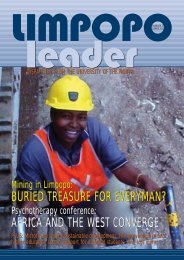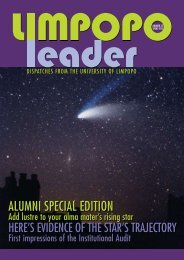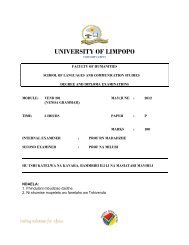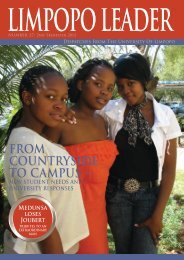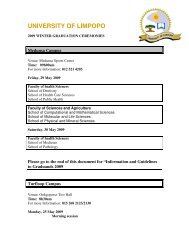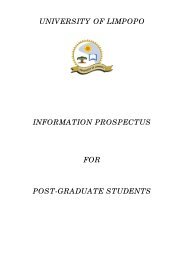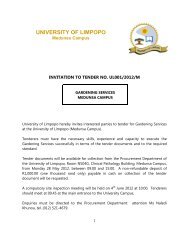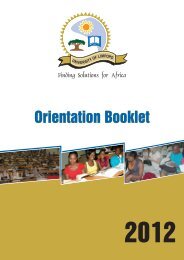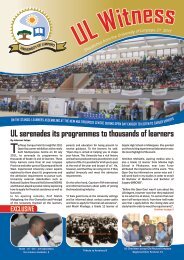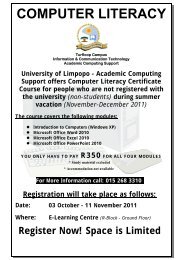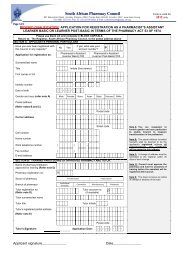Limpopo Leader - University of Limpopo
Limpopo Leader - University of Limpopo
Limpopo Leader - University of Limpopo
Create successful ePaper yourself
Turn your PDF publications into a flip-book with our unique Google optimized e-Paper software.
Campus with a pastTHE HIGHS AND LOWS FROM THE TOPAfter a while I asked the students if they wanted a cup<strong>of</strong> tea. This <strong>of</strong>fer was firmly turned down. I, though,enjoyed a cup <strong>of</strong> tea with 20 students eyeing me sullenly.‘Within less than two hours, the strikers realisedthat this was a battle that they were not going to winand without a word or backward glance they troopedout <strong>of</strong> my <strong>of</strong>fice. I had no more problems with sit-instrikes.’During his tenure as Vice-Principal, Karlsson heldthe position <strong>of</strong> acting Vice-Chancellor when Pr<strong>of</strong>essorLeon Taljaard was given a six-month sabbatical.It coincided with a strike <strong>of</strong> a more ominous nature.The domestic staff went on strike. Negotiations and<strong>of</strong>fers <strong>of</strong> mediation were refused. The strike went on,but then word came from within the workers’ ranksthat their resolve was weakening. They wanted toreturn to work and enter into further negotiations whileat work. But before this could be agreed, the worsthappened. The total student body went on a classboycott in sympathy with the workers. The studentrepresentatives refused to meet the administration untilthe demands <strong>of</strong> the striking workers had been met.Karlsson continues the story, ‘The Senate discussedthe issue and there was little sympathy for thestudents. The decision was made to take a firm line.Giving in to unreasonable demands would only resultin an escalation <strong>of</strong> new demands. The boycottdragged on, and increasingly, notes were beingslipped under my door. “Please call in the cops.We want to go back to class”. An acrimoniousmeeting with the student representatives showed littleprogress, but at least we were talking. I receivedmore notes from students urging me not to give in.They wanted to see the domination <strong>of</strong> a few militantsbroken.‘After five weeks the boycott was suddenly over.As I drove onto campus it was to see studentsstreaming back to their classes. Some gave thethumbs up sign. I heard later that the militants hadbeen threatened with retaliation from the mainstudent body.’A more productive event for Karlsson and one <strong>of</strong>the highlights <strong>of</strong> his year, was the first meeting hehad with Herb and Joy Kaiser, the American couplewho established MESAB, Medical Education forSouth African Blacks. Herb was a diplomat attachedto the American Embassy in Pretoria. He had hadcancer <strong>of</strong> the bowel and a Pretoria surgeon had operatedon him, which resulted in complete recovery fromthe cancer. The surgeon in question was now Pr<strong>of</strong>essor<strong>of</strong> Surgery at Medunsa. In appreciation Herb wantedto give something back, especially in the medicalfield, to South Africa – the Faculty <strong>of</strong> Medicineseemed the logical starting point.‘We discussed various options, relates Karlsson.‘I was now more firmly convinced than ever that theSouth African medical services needed to fast trackthe training <strong>of</strong> black doctors. The major impedimentwas the lack <strong>of</strong> financial support for such aprogramme. Our bursary fund seemed to be theway to go. The Kaisers were enthusiastic and withincredible drive, they set up the MESAB programmeon their return to the US.’A high-pr<strong>of</strong>ile board was appointed and fundinginitiatives started. Soon enough funding had beensecured to take five students through their six years<strong>of</strong> study. The programme expanded rapidly and wassoon supporting black medical students in otheruniversities. Later on nurses and physiotherapists alsobenefited.‘The story <strong>of</strong> MESAB is about the devotion <strong>of</strong> twopeople. Over a period <strong>of</strong> about 20 years, more than2 000 black doctors qualified with MESAB assistance.I believe medical history will record the important rolethat MESAB played in addressing the imbalancebetween the numbers <strong>of</strong> white and black doctors inthe country,’ Karlsson states. In recognition <strong>of</strong> theircontributions to the training <strong>of</strong> black doctors inSouth Africa, the Kaisers were both awardedhonorary doctorates by Medunsa.Karlsson handed over his Vice-Principal’s reignsto Pr<strong>of</strong>essor Ephraim Mokgokong, HOD <strong>of</strong> Obstetricsand Gynaecology since 1978 and long–timecolleague and friend, in 1990. In an interview at thetime with Medunsa Brief, Mokgokong looked ahead:‘It is time for me to concentrate on the academichealthcare philosophy, not only <strong>of</strong> Medunsa, but also<strong>of</strong> the country as a whole. I’ll certainly miss the hustleand bustle <strong>of</strong> obs and gynae, but I look forward tothis next phase. I have no doubt that in years to comeMedunsa will remain the predominant medical schoolin the country.’As usual, he was right.P A G E 3 2



